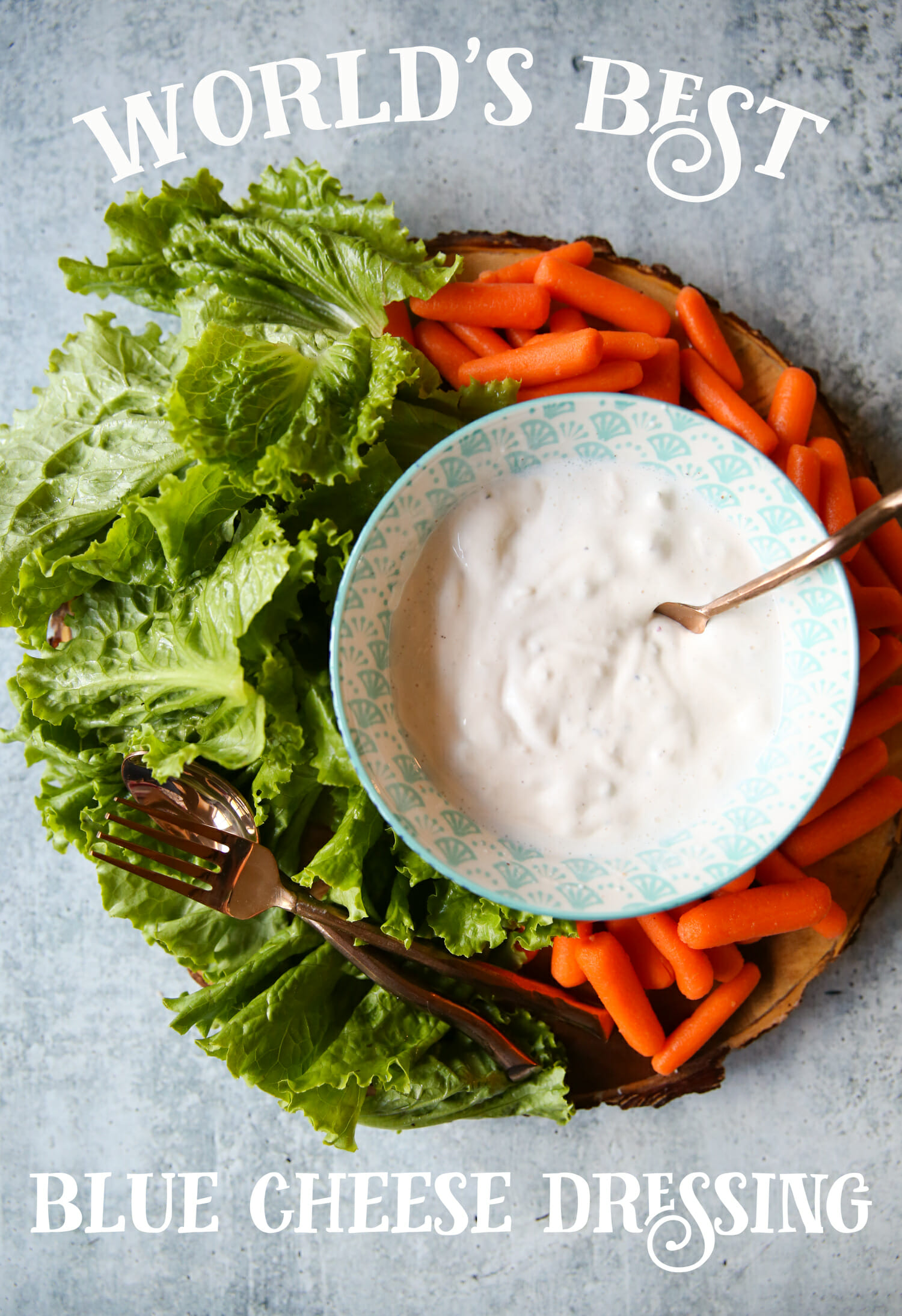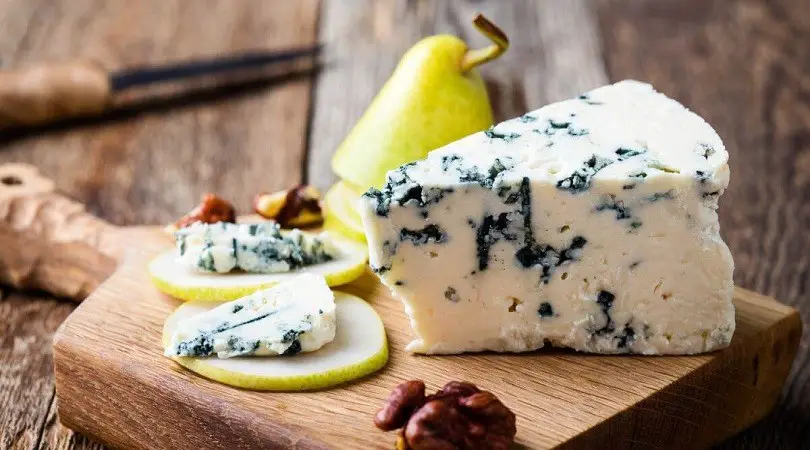Last Updated on January 6, 2025
Yes, it is safe to eat blue cheese dressing while pregnant as long as it is made from pasteurized cheese. During pregnancy, it’s important to ensure that any cheese consumed is pasteurized to minimize the risk of bacterial infection.
Eating a well-balanced diet is crucial during pregnancy to ensure the health and development of both the mother and the baby. However, certain foods may pose potential risks to pregnant women due to the potential presence of harmful bacteria. One question that often arises is whether it is safe to consume blue cheese dressing during pregnancy.
Blue cheese dressing, known for its tangy and creamy flavor, is made from blue cheese, which is a type of cheese that is aged with the growth of specific mold. Concerns about the safety of blue cheese dressing arise due to the possibility of it being made from unpasteurized cheese, which may harbor harmful bacteria. Let’s explore whether blue cheese dressing is safe for pregnant women to consume and what precautions should be taken.

Credit: ourbestbites.com
Related: Can I Eat Brownies During Pregnancy?
Understanding Blue Cheese Dressing
Blue cheese dressing is a popular condiment enjoyed by many. It adds a creamy and tangy flavor to salads, sandwiches, and other dishes. But if you’re pregnant, you may have heard conflicting information about whether it’s safe to consume. In this section, we’ll dive into what blue cheese dressing is, its ingredients, and some popular brands you can find in the market.
What Is Blue Cheese Dressing?
Blue cheese dressing is a type of salad dressing made by combining blue cheese with other ingredients, such as mayonnaise, sour cream, buttermilk, and various seasonings. It often has a thick and rich consistency, making it perfect for dipping veggies or drizzling over a crisp salad.
Blue cheese, known for its distinct pungent taste and blue veining, gives the dressing its unique flavor.
Ingredients In Blue Cheese Dressing
Blue cheese dressing typically contains a variety of ingredients that contribute to its creamy texture and flavor. The exact composition may vary among brands, but common ingredients found in blue cheese dressing include:
- Blue cheese: The star of the show, blue cheese gives the dressing its characteristic flavor.
- Mayonnaise: Provides a creamy base and adds richness.
- Sour cream or buttermilk: Helps to create a smooth and tangy consistency.
- Vinegar: Adds a hint of acidity and balances the flavors.
- Garlic and onion powder: Enhances the overall taste profile.
- Salt and pepper: Seasonings that bring out the flavors.
Please note that some brands may include additional ingredients or variations in the proportions, so it’s always a good idea to check the label for the specific ingredients used in the blue cheese dressing you choose.
Popular Brands Of Blue Cheese Dressing
If you’re craving blue cheese dressing during pregnancy, you’ll find several trusted brands available in the market. Here are a few popular options:
- Ken’s steak house: Known for its flavorful dressings, ken’s steak house offers a tasty blue cheese dressing that pairs well with salads and dips.
- Marie’s: Marie’s is known for its natural ingredients and offers a creamy blue cheese dressing that is perfect for adding a burst of flavor to your favorite dishes.
- Hidden valley: Famous for its ranch dressings, hidden valley also offers a delicious blue cheese dressing that you can find in most grocery stores.
Remember to check the labels for any potential allergens or specific ingredients you may want to avoid during pregnancy.
Blue cheese dressing can be a delightful addition to your meals while pregnant. However, it’s essential to consume it in moderation and ensure that the dressing is made with pasteurized ingredients to reduce any risk of foodborne illnesses. As always, consult with your healthcare provider for personalized advice based on your specific health needs during pregnancy.
Related: Can Pregnant Ladies Eat Fondue?
Blue Cheese And Pregnancy: A Controversial Connection?
The Concern Around Eating Blue Cheese During Pregnancy
———————————————————-
Blue cheese is a popular choice for salads, dips, and dressings due to its unique flavor and creamy texture. However, when it comes to pregnancy, there is a lot of debate surrounding the consumption of blue cheese. Let’s unpack the concerns and potential risks involved.
Potential Risks Associated With Blue Cheese:
Blue cheese has been linked to certain bacteria that can be harmful when consumed during pregnancy, specifically a bacteria called listeria monocytogenes. This bacteria can lead to a foodborne illness called listeriosis, which poses a risk to both the pregnant woman and her developing baby.
Some potential risks associated with listeriosis include:
- Miscarriage or stillbirth
- Preterm labor
- Infection in the newborn baby
Understanding The Role Of Bacteria In Blue Cheese
The Role Of Bacteria In Blue Cheese:
Blue cheese, like roquefort, gorgonzola, and stilton, is made using a specific type of bacteria called penicillium. This bacteria is responsible for the blue veins and distinct flavor of these cheeses. However, it’s important to note that not all bacteria are harmful.
In fact, our bodies are home to many beneficial bacteria that aid in digestion and overall health.
The Importance Of Pasteurization:
One way to mitigate the potential risks associated with blue cheese is by ensuring that it is made from pasteurized milk. Pasteurization is a process that involves heating the milk to kill harmful bacteria. Most commercially produced blue cheeses are made from pasteurized milk, making them safe to consume during pregnancy.
However, it’s essential to always check the label or ask the manufacturer to confirm the cheese’s pasteurization status.
Safe Alternatives:
If you’re craving the tangy flavor of blue cheese but are concerned about the potential risks, there are safe alternatives available. Some options include:
- Look for blue cheese substitutes made from pasteurized milk, such as imitation blue cheese dressings.
- Opt for other types of cheese that are considered safe during pregnancy, such as cheddar, mozzarella, or swiss cheese.
- Experiment with different flavors and textures by using herbs and spices to enhance your dressings or dips.
It’s always a good idea to consult with your healthcare provider or a registered dietitian to address any concerns or questions you may have about consuming blue cheese or any other foods during pregnancy. By understanding the potential risks and making informed choices, you can ensure the health and safety of both you and your baby.
Related: Can You Eat Jerky While Pregnant?
Safe Alternatives And Precautions
Can You Eat Blue Cheese Dressing While Pregnant?
Blue cheese dressing is a delicious addition to many meals, but when you’re expecting, it’s important to consider the safety of the foods you consume. Blue cheese dressing is made from blue cheese, which is a type of cheese that is known for its distinct sharp and tangy flavor.
Blue cheese is made using mold cultures, which can sometimes be harmful during pregnancy. We will explore safe alternatives to blue cheese dressing and the precautions you should take if you choose to consume it while pregnant.
Safe Alternatives To Blue Cheese Dressing
While it’s best to avoid blue cheese dressing during pregnancy, there are several safe alternatives that you can enjoy without worrying about potential foodborne illnesses. Here are some delicious options to consider:
- Ranch dressing: This creamy dressing is a popular choice and pairs well with salads, veggies, and even as a dipping sauce.
- Italian dressing: Made with a blend of herbs and spices, this dressing adds a burst of flavor to any dish.
- Balsamic vinaigrette: If you’re looking for a tangy and slightly sweet option, balsamic vinaigrette is a great choice.
- Lemon vinaigrette: Made with fresh lemon juice and olive oil, this dressing is light and refreshing.
- Yogurt-based dressings: Opt for dressings made with yogurt as a base for a creamy and healthy alternative.
Precautions To Take When Consuming Blue Cheese
If you can’t resist the allure of blue cheese dressing and decide to consume it while pregnant, it’s important to take certain precautions to minimize the risk of foodborne illnesses. Here are a few key precautions to keep in mind:
- Check the label: Make sure to read the label carefully and look for pasteurized blue cheese dressing. Pasteurization helps eliminate harmful bacteria, making it safer to consume during pregnancy.
- Freshness matters: Ensure that the blue cheese dressing is fresh and hasn’t expired. Expired products may contain higher levels of bacteria.
- Store properly: Properly refrigerate the blue cheese dressing to keep it fresh and prevent the growth of harmful bacteria.
- Limit consumption: It’s best to consume blue cheese dressing in moderation. Avoid overindulging, as excessive consumption may increase the risk of foodborne illnesses.
Expert Advice On Pregnancy-Safe Food Choices
When it comes to pregnancy, it’s crucial to prioritize the safety of the foods you eat. Consulting with medical professionals, such as your healthcare provider or a registered dietitian, can provide you with expert guidance tailored to your specific needs.
Here are some general tips to keep in mind:
- Wash produce thoroughly: Properly wash fruits and vegetables to remove any potential harmful bacteria.
- Cook meat thoroughly: Avoid consuming undercooked or raw meats, as they may harbor harmful bacteria or parasites.
- Opt for pasteurized dairy products: When consuming dairy products, choose pasteurized options to minimize the risk of foodborne illnesses.
- Maintain proper hygiene: Practicing good hand hygiene and food safety measures can greatly reduce the risk of contamination.
Remember, your health and the health of your baby are of utmost importance. By making informed choices and taking necessary precautions, you can enjoy a safe and healthy pregnancy.
Enjoying Dressings Safely During Pregnancy
Pregnancy is an exciting and joyful time in a woman’s life. However, it also comes with its fair share of dietary restrictions and concerns. One common question that often arises is whether it’s safe to consume blue cheese dressing while pregnant.
In this section, we will explore some tips and guidelines to help you enjoy dressings safely during your pregnancy journey.
Tips For Making Safe And Delicious Homemade Dressings
When it comes to dressings, making your own at home can be a great option both for taste and ensuring that they are pregnancy-friendly. Here are some tips to keep in mind:
- Opt for pasteurized ingredients: Choose pasteurized dairy products and eggs to reduce the risk of consuming harmful bacteria.
- Use vinegar or citrus: Adding vinegar or citrus juices like lemon or lime can not only enhance the flavor but also increase the acidity of the dressing, making it safer to consume.
- Experiment with different herbs and spices: Get creative with herbs and spices to add flavor without relying heavily on ingredients that may be unsafe during pregnancy.
How To Read Labels And Identify Pregnancy-Friendly Dressings
Reading labels carefully is crucial during pregnancy, as certain ingredients may be harmful to the developing baby. Follow these guidelines when selecting dressings:
- Check for pasteurization: Ensure that all dairy products used in the dressing, such as milk, cheese, or yogurt, are made from pasteurized milk.
- Avoid raw eggs: Dressings that contain raw or undercooked eggs, such as caesar dressing, should be avoided due to the risk of salmonella.
- Be cautious with additives: Some dressings may contain additives and preservatives that are not recommended during pregnancy. Look for dressings with minimal additives or opt for organic varieties.
Indulging In Moderation: Finding The Right Balance For Your Cravings
Cravings during pregnancy are common, and it’s okay to indulge in your favorite dressings occasionally. Here are some tips to help you find the balance:
- Practice moderation: Enjoying small portions of dressings rather than large amounts can help satisfy your cravings while minimizing any potential risks.
- Alternate dressings: Consider using alternatives to blue cheese dressing, such as ranch or vinaigrette, which are typically considered safer choices during pregnancy.
- Listen to your body: If you start experiencing any discomfort or adverse reactions after consuming a particular dressing, it’s essential to stop consuming it and consult your healthcare provider.
Remember, every pregnancy is unique, and it’s important to consult your healthcare provider for personalized advice and guidance regarding your dietary choices during pregnancy.
Lastly, enjoy your meals and savor the flavors while keeping safety in mind. Happy dressing!
(note: this ai was trained on a mixture of licensed data, data created by human trainers, and publicly available data. It is not intended to provide medical advice, diagnosis, or treatment. Consult a healthcare professional for personalized advice. )
Frequently Asked Questions Of Can You Eat Blue Cheese Dressing While Pregnant?
Can Pregnant Women Eat Blue Cheese Dressing?
Yes, pregnant women can eat blue cheese dressing as long as it is made from pasteurized cheese.
Is Blue Cheese Dressing Safe During Pregnancy?
Yes, blue cheese dressing is safe during pregnancy if it is made from pasteurized cheese.
What Are The Risks Of Consuming Unpasteurized Blue Cheese Dressing While Pregnant?
Consuming unpasteurized blue cheese dressing during pregnancy can increase the risk of foodborne illnesses, such as listeriosis.
How Can I Ensure The Safety Of Blue Cheese Dressing During Pregnancy?
To ensure the safety of blue cheese dressing during pregnancy, make sure it is made from pasteurized cheese.
Are There Any Alternatives To Blue Cheese Dressing For Pregnant Women?
Yes, pregnant women can opt for alternatives like ranch dressing or vinaigrette dressings during pregnancy.
Conclusion
Concerns about consuming blue cheese dressing during pregnancy are valid due to the potential risks associated with certain types of soft cheeses. However, it is important to note that not all blue cheese dressings are created equal. Some commercial brands use pasteurized blue cheese, which has undergone heat treatment to eliminate harmful bacteria.
When opting for blue cheese dressing while pregnant, it is crucial to read labels and choose those made with pasteurized cheese. Additionally, it is wise to consume blue cheese dressing in moderation and be cautious when dining out, as the handling and storage of ingredients can vary.
Ultimately, consulting with a healthcare provider is the best course of action to determine what is safe for individual circumstances. Remember, maintaining a balanced diet and practicing food safety is crucial during pregnancy, ensuring the well-being of both mother and baby.











